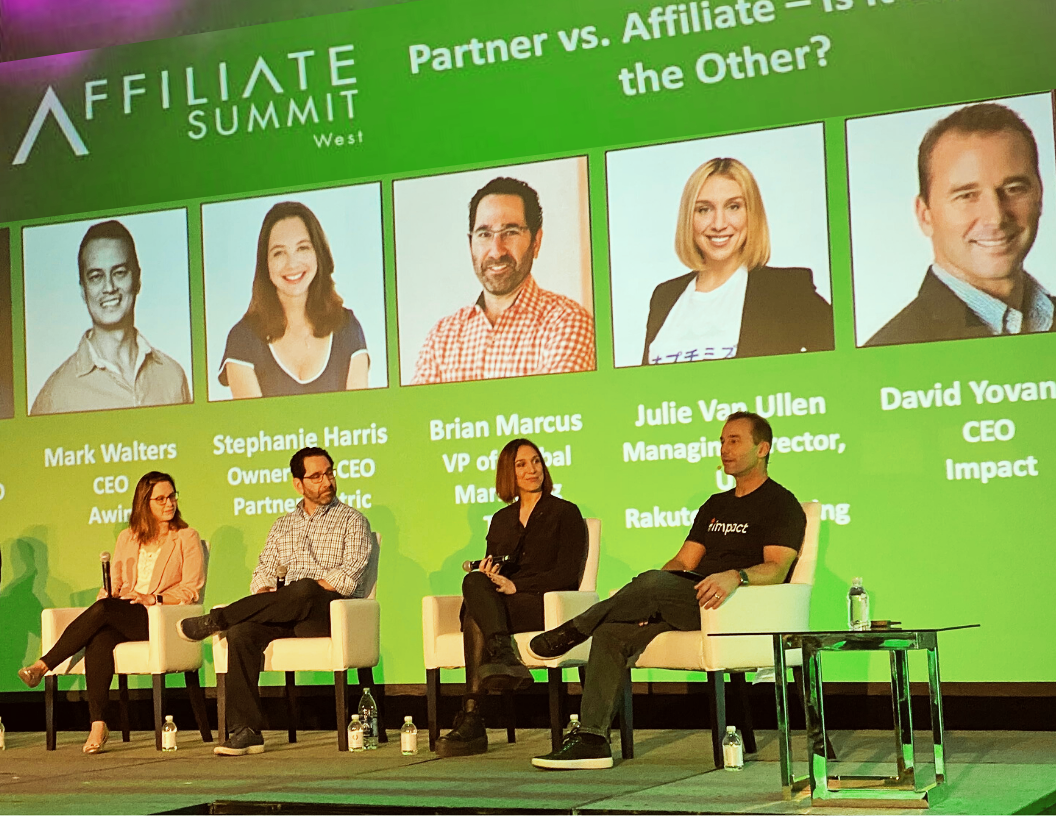At Affiliate Summit West 2020, I had the privilege of clearing the air, while sitting among other industry leaders, about a controversial topic that, admittedly, my company raised with the publication of our forward-thinking ebook, “Affiliate Marketing Is Dead.” While the headline was indeed meant to raise some eyebrows, the content really took aim at the popular affiliate marketing tactics of scattering seeds everywhere, leading to sub-optimized, bloated programs that result in a bad experience for everyone involved, especially the end consumer.
Which is it — affiliate or partner?
One of the questions from the panel yesterday was “partner or affiliate . . . which do you prefer and why?” My answer: both. I think the terms “partner” and “partnerships” represent an important evolution of our industry that includes affiliates. Similar to the evolution on the demand side of our industry, in the beginning we only referred to them as merchants. We now refer to them interchangeably as merchants, brands, and businesses, with merchants being just one type of brand or business that we service today.
Similarly, we are evolving from affiliates to partners, as affiliates are just one of many types of partnerships that exist today. But before we go further, it’s essential that I first state my definition of “affiliate” and “partner.”
What is “affiliate?” Proven, competitive, and . . . limited
Affiliate is a proven business model, and affiliates make the majority of their money through affiliate marketing — it’s their core business. And what’s great about that is everyone understands this segment of the industry: affiliates are essentially plug-n-play — up and running quickly. They are transactional, and that’s a good thing because marketers are busy and expect results quickly.
Affiliates are also ultra-competitive; it’s pay-to-play for offer placement, and they will sometimes displace competing offers for a higher payout. With that, an affiliate’s main relationship is with an affiliate network, who they rely on to feed them a large volume of offers to test and move on to the next offer in search of something better.
Finally, affiliates are also somewhat limited in the types of businesses and conversion types they work with, because of everything I just mentioned — and also because the tactics they use are primarily cash back, coupons, loyalty, arbitrage, and such. With this limitation, combined with other macro growth challenges (more later on these), businesses have been evolving to also incorporate other partnership types as well. What does all this show? Affiliates are just one of many partnership types.
Beyond affiliate, businesses can discover other types of productive partnerships
Other types of partnerships include software integrations, business development deals, social responsibility partnerships, influencers, media publishers, and podcasts (and many more). Many of these types are businesses and individuals whose main purpose is not running an affiliate program. They’re producing content, selling other products, or providing other services. Different from an affiliate — if you were to call them and ask them to join your affiliate program, many would respond “what’s that?” One example might be Microsoft, which partners with training centers that refer software sales. Because they may not even understand what affiliate marketing is, it often takes more work to get them up and running. They are not as familiar with how it all works, how to sign into UIs, how to grab tracking links, and so on.
It’s a new world of consumers — trusted recommendations are key
We are operating in a discovery- and community-driven environment today for purchase decisions — and these decisions are happening through the people you follow, trusted businesses you buy from, and subjects and items you research — people don’t want to be advertised to or sold to anymore.
Partner recommendations typically lend more credibility than affiliate offers: partners can provide more native, integrated, authentic content, plus they care very much about the business they are referring. After all, their reputation is on the line with their core business and they want to provide value to their audience or customers — it’s at the heart of these partners’ missions. In these kinds of partnerships, you often see less offer competition in comparison to affiliates, but they do tend to take longer to establish because they’re not as savvy with the technology and other inter-workings of establishing a partnership to refer business.
What’s incredibly compelling, though, is that while it’s highly unlikely that you can convert these other partnership types to be an affiliate, you can and should work with your affiliates as partners. This was the main message in our original piece “Affiliate Marketing Is Dead,” especially for those who never made it past the title and took offense. Key ways to work with affiliates as true partners are to share data, share goals, test different strategies, give free samples, and work directly with them to drive more innovation, value, and a better experience for the end user.
Is it just the word “affiliate” that we want to get away from?
Onstage I told the story of a major tax client who challenged me to explain when affiliate would stop being the “sand between the rocks.” Meaning her “rocks” were search, TV ads, etc. Affiliate was flat, not growing, same top affiliates year after year, and not contributing a meaningful percent of total revenue mix. It was a grain of sand to her. Since coming over to the Impact platform, her partnership channel is growing at least 30% as they’ve learned to embrace Impact’s partnership automation technology as well as incorporating other partnership types.
Another story is FuboTV, which ran a successful affiliate program years ago when their subscription price was $10 per month. However, as they added programming and the price increased to $50 per month, it was no longer a fit for an affiliate program based on the limitations I stated above. The FuboTV team was forced to develop a new partnership strategy that included partnering with top media publishers, providing them with content important to their audiences, but that would also refer them new subscribers.
It’s not that Impact is moving away from the word affiliate — it’s not that at all. We are championing the evolution of new and different types of partnerships in addition to affiliates: software integrations, business to business partnerships, social responsibility, influencers, media partners, and podcasts (as I mentioned above).
The words partner and partnerships are 100% real, not simply a new label on affiliate, and are essential to framing a discussion with businesses and CMOs about growth for our industry that has the potential to be 100X. We didn’t create the word “partnerships,” our clients did.
We are seeing a strong preference towards “partnerships” from our 1,000+ clients primarily for two reasons:
- Innovation in new partnership types, which I believe Impact’s technology has partly inspired, and
- The consolidation of many different siloed teams with businesses today, for example, affiliate teams consolidating with influencer and business development teams.
To help illustrate: look up Kirk Hausman’s profile. He is a Senior Manager of Strategic Partnerships at Walmart today but began his career in affiliate and SEO. He started with just affiliate at BarkBox and then began to fully embrace Impact’s technology and vision for growth through other partnership types as well. Inspired by non-traditional partnerships that were being formed, Kirk’s team began calling on thousands of pet shelters and dog walkers to refer new subscribers to the monthly box of pet treat and toys. Long story short: BarkBox’s growth skyrockets, he gets promoted to a Senior Growth Marketing Manager while still at BarkBox, then is offered an opportunity to work at Walmart managing strategic partnerships. That’s pretty cool.
Aren’t “partnerships” the same thing as the “performance marketing” shift a few years back?
Not really. Back then, there was no change to people, process, or technology that we’re seeing in partnerships and partnership automation today. Partnership teams are now forming within businesses through the consolidation of many siloed teams. Those teams are managing partnerships like a sales or marketing function, including pursuing new partnership types, and technology is automating a lot of it now, which didn’t exist before. For the first time, technology is fueling innovation in our industry. And much like how Salesforce drove innovation in sales through automation, and Marketo and Hubspot drove innovation in marketing through automation, Impact is playing a key role in driving innovation in partnerships through it’s software automation for discovery and recruitment, contracting and payment, tracking, engagement, protection and monitoring, and optimization of all partnerships.
And this entire partnerships industry — affiliates, influencer programs, and other partnerships — is being helped by the macro trends of today’s negative consumer sentiment towards sales, marketing, and advertising, which is pushing people to rely more on their own research and recommendations from people and businesses they trust. And as well, with the concentration of ad dollars mainly with just Facebook and Google, where prices are skyrocketing, and tracking and measurement is plummeting.
It really seems to me that the universe has shifted squarely to the partnership economy — and this industry has a massive opportunity to unlock it and capitalize on it. I believe that the professionals who began their careers in affiliate like Kirk Hausman are best positioned to be the leaders within their organizations to pursue the expanding opportunity in partnerships — as previously siloed teams continue to consolidate and form, and as partnerships as a category and growth channel take center stage. They have the business development skills, they have the technical skills, they know how it all works, and importantly, they typically have an entrepreneurial spirit that brings an x-factor to the table for any business.
Summary
Our industry has always been about providing businesses and partners the most efficient and effective ways to grow their business. As we look to the future, that will continue to be the case. There is credible data from research firms like Forrester that partnerships are the next wave of enterprise growth, driving more than 25% of total revenue mix. Compare this to search, which is less than 20% of total revenue mix and not growing as fast. And even more interesting is that we are seeing the partnerships channel grow at over 50% for our most mature clients.Considering the mistrust in traditional sales and marketing tactics, and the concentration of ad dollars with just two to three large companies, partnerships truly are the alternative that can deliver scale efficiently, and do this by authentically reaching your target customers. When it comes to “affiliate” or “partner” — I choose both because partnerships, which affiliates are part of, play an essential role in the future of enterprise growth.




